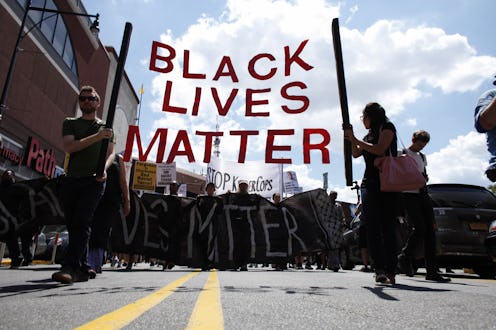News
An Innocent Black Man Became America's Most Wanted
When I heard that two police officers had been shot during a Dallas protest, my first thought was, "Please don't let the shooter be black." But he was, and then, he wasn't. The Dallas Police Department wrongfully published a suspect's photo all over the internet and sent it to their local (and eventually national) news broadcasts. But the black man in the photos, Mark Hughes, was one of the hundreds of peaceful protesters that Thursday night. In fact, his brother Cory had organized the Black Lives Matter protest. He was not a suspect at all, and the DPD had no legitimate basis to accuse him of such.
I didn't want the Dallas shooter to be black because I feared what that would do for Black Lives Matter arguments and progress. If the shooter was black (and one still might be), I worried how that would perpetuate stereotypes of "inherently violent and dangerous" black people. I worried that people would use this incident to justify the police-involved murders of innocent black people around the country.
In the photo from the protest, Hughes is wearing a camouflage shirt and he has a rifle strapped around his body. Hughes is a licensed gun owner, so, thanks to Dallas' gun laws, he was legally permitted to openly carry his weapon during the protest. But if the DPD had communicated with one another at all on this matter — on the very serious matter of correctly publishing information about a suspect — they would have realized that Hughes voluntarily handed his gun over to a police officer after the shooting happened. He didn't want to be accused of being involved. He didn't want a police officer to see him with a weapon, one that he was legally licensed to own and to carry, and to open fire on him after making the wrongful assumption that he was involved in the shooting against the police.
But despite following the law and even taking extra precautions to avoid confusion, the DPD publicly criminalized Hughes and called for a national witch hunt in search of a "suspect" who was anything but a suspect.
My first thought upon seeing this photo, "What if they're wrong?" And they were. We live in a world in which 123 black people have been fatally shot by police in 2016, and for a hell of a lot less than being accused of shooting 10 police officers in a single evening. By spreading Hughes' photo to a national audience and accusing him of this horrific attack against law enforcement, the DPD put a direct, life-threatening target on Hughes.
That original tweet from DPD was posted at 10:52 p.m. CT. At 10:55 p.m. CT, another Twitter used tweeted DPD in what he clearly assumed was "helpful evidence" and further tried to prosecute a black man of a crime against law enforcement when this man was peacefully following the law.
At 11 p.m. CT, just five minutes later, an ABC affiliate in Dallas jumped on the opportunity to further spread Hughes' photo and information, thus expanding the national hunt for Hughes and, ultimately, his body.
"But what if they're wrong?" I thought again, this time with amplified fear and anxiety, especially as the number of injured officers increased from two to 10, and especially when the fifth officer was pronounced dead. It was horrifying to think that Hughes, a black man, would carry out this calculated attack against police officers at a peaceful protest organized by Black Lives Matter activists. But it was more horrifying to think that the media and the DPD got it wrong, and that with zero regard for Hughes' life and every regard for the color of his skin, yet another innocent black man was thrown into the national spotlight and destined to be killed too soon because of the inherent "threat" posed by his blackness.
And then the truth started to come out that Hughes, despite his black skin and licensed gun, was not a suspect at all.
Hughes' brother, Cory, ran to news reporters on the scene as soon as he heard that his brother's face was being plastered all over the national media in connection with the Dallas shootings. Hughes went from a peaceful, Black Lives Matter activist to America's Most Wanted in a matter of minutes.
I'm not saying that I would feel comfortable at a protest with people openly carrying guns, but I'm also just someone who is generally uncomfortable about guns. But, as Cory told the reporter who asked why his brother was carrying a gun at the peaceful protest, "It is his right." Just as it was Sterling's right in Louisiana and Castile's right in Minnesota to legally carry a gun, but those men were killed for following their states' gun laws, and Hughes could have been next.
The racial tensions in America have heightened over the last few years as police-involved murders of black men, women, and children have shaken our nation to its core. Peaceful protests are one way to try to bring communities together after these senseless killings. But, as we saw Thursday night with the Dallas protest shootings, there remains an inherent, nasty breed of racism in many Americans when it comes to associating blackness with a level of perceived threat and distrust.
Hughes handed his gun over to a police officer and they exchanged business cards so that Hughes could retrieve his gun at a later date. But Hughes' accusers at the DPD didn't question if he had a license to carry. They didn't stop to follow up with other DPD officers to confirm whether or not Hughes had willingly given up his gun after he recognized the severity of the situation. Instead, they saw an easy target: a black man in a camouflage t-shirt carrying a weapon in public (in a state that has liberal open carry laws, mind you). They saw a black man whose life didn't matter.
